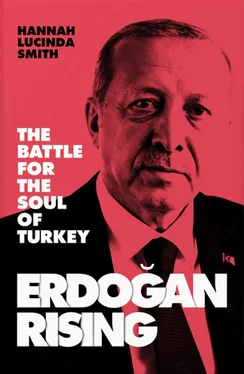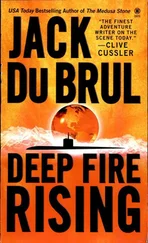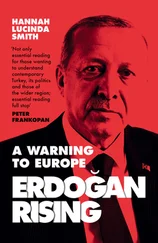I have to give it to him – Turkey’s president has handed me some great material. Often, I have wished I could hand it back.
Erdoğan is the original postmodern populist. In power for seventeen years, his latest election win in June 2018 means he will stay until at least 2023. Already there is a generation of Turks who can remember little or nothing before the Erdoğan era, and his detractors have much to worry about. They fret over his creeping Islamisation of Turkey, once the staunchest of secular states. They point to his fierce crackdown on Kurdish rebels in the east of his country, where hundreds of thousands have been killed or displaced, and his cosiness with armed rebel groups of questionable ideology in Syria. Europe, which once saw Erdoğan as its darling, now deals with him increasingly as if he were an obnoxious teenager. The inhabitants of the Greek islands within spitting distance of the Turkish coast hold their collective breath and brace each time he threatens to open his borders to allow hundreds of thousands of migrants to flow across the Aegean in cheap plastic boats.
I have spent six years watching Erdoğan, speaking to his followers, and sniffing the winds. I think about him every day and write about him on most days, even though we have never met. But I never set out to be an Erdoğan-watcher, or even to be a Turkey correspondent.
In early 2013 I moved from London to Antakya, a tiny town on Turkey’s southern border with Syria, to pursue a career as a freelance war correspondent. The war next door had turned Antakya into a busy hive of spooks, arms dealers, refugees and journalists. The Syrian rebels had captured two nearby border crossings from President Bashar al-Assad’s forces, and I spent a year crossing back and forth through them into Syria to report on the spiralling slaughter. But as Syria turned darker and colleagues started to go missing at the hands of criminal gangs and Islamist militias, the journalists dropped away from Antakya. Along with most of the Syria reporter crowd I moved north, to Istanbul, where not so much was happening.
The huge Gezi Park protests, which in the spring of 2013 had briefly morphed from small environmentalist demonstrations into the most serious street opposition Erdoğan had ever faced, had now petered out into leftist forums scattered across Istanbul’s upmarket districts. They were happy protests – anyone could stand on a soapbox and, instead of clapping (too bawdy and overwhelming), the audience would wiggle their raised hands in appreciation. I doubt they caused Erdoğan too much anguish. For a year or so after Gezi, small-scale street demonstrations became the city’s number one participation sport – with protagonists boiled down to a hard core who just seemed to enjoy getting tear-gassed. One student ringleader I interviewed talked about upcoming protests as ‘clashes with the cops’, as if that were the main point of the event. The demonstrations became so common and predictable they were more of a nuisance than news. Several times over the course of that year, tear gas seeped into my bedroom as I tried to sleep.
I was bored and sad. I had left Syria, a story I had moved countries for and invested so much energy in. I yearned for the day I could go back and start reporting from there again. I was still dating a Syrian man down in Antakya, and I spent half of my time there with him. Strange as it feels to remember it now, there just wasn’t much of a story up in Istanbul.
But one day I fell in love. Travelling back from Antakya to Istanbul on the cheap late-night flight, I looked out of the window as the plane came in to land in a huge swoop across the city. On either side of the black scar of the Bosphorus, millions of pinprick lights marked out the shape of the shoreline, the traffic-clogged roads, the bridges and the palaces. From above, this scruffy city glistens, and I was glad to be back: it’s a feeling I still get every time the seatbelt sign comes on over Istanbul. It had taken me six months to realise that my banishment from Syria had landed me in the most beautiful, melancholy, fascinating city in the world. Gradually I stopped going down to Antakya, and my relationship with the Syrian fell away.
So, by chance rather than by my own good judgement, I was one of the few reporters based in Turkey full time when the news started flowing – the bombings, the diplomatic spats with Europe, and the overwhelming interest in Erdoğan. As the months progressed, I realised that even the most parochial, insignificant Turkish story could make a headline if Erdoğan were somehow involved. One I particularly remember is a story about his wife, Emine, and a speech she had made suggesting that the Ottoman sultans’ harem, the place where scores of potential sexual partners were kept, could be considered a bastion of feminism. The Western press went nuts – even though there is a serious line of academic debate that would concur with Emine. The interest in Erdoğan, as well as the growing chaos in Turkey, soon landed me regular work filing reports for The Times .
I found myself fascinated by him, too. The first time I saw Erdoğan in the flesh was not for a story – it was just because I happened to be in the area and was interested. In May 2013, while I was still living in Antakya, a double car-bombing hit Reyhanlı, another small Turkish border town hosting thousands of Syrian refugees. The attack was the first spill-over from the Syrian conflict, and the toll was horrific: fifty-two people killed and the heart of the town ripped out. Pieces of seared flesh were later found in the town’s sewers, so intense was the force of the blasts. Some Syrians headed back across the border into the war zone, fearing they might soon feel the brunt of the locals’ anger if they stayed. A week later, Erdoğan went to Reyhanlı to speak to the people. As it was only half an hour down the road from Antakya, I decided to go.
Compared to what I would see in later years, the crowd then was small and calm and Erdoğan’s speech was measured. But that day I noticed certain things I would go on to see again and again: how hundreds of people appeared to have been bussed in from every corner of the country, how party volunteers were handing out flags and baseball caps which, when televised, gave the appearance of a sea of red, and how the people who had showed up seemed to care far more about being close to Erdoğan than about what had happened in Reyhanlı.
How different that low-key event was to the time I saw him four years later, on a chilly May Sunday in 2017. It was a month after he had snatched narrow victory in a constitutional referendum to switch legislative power from the parliament to the president, and the AKP was holding its party congress in Ankara’s main basketball arena. By the time I took my seat at 8 a.m., the entire place was packed and rowdy with young men chanting for their hero. Erdoğan was due to take the stage around noon, to reclaim his place at the head of the party. He had nominally stepped down when he resigned as prime minister and was elected president three years earlier – the head of state was supposed to be politically unaffiliated according to the old, now-discarded constitution. In reality he had never loosened his grip over the party. He continued to campaign for the AKP in parliamentary elections, and had publicly ousted a prime minister who had dared to stray too far from his line.
As a political spectacle, the congress was incredible. There were men in the crowd who had arrived dressed as Ottoman sultans, sitting alongside Kurdish women holding banners proclaiming they were from şırnak, an eastern town that had recently been decimated by fighting between Turkish security forces and Kurdish militants. ‘Everything for the homeland!’ they whooped, ululating as Middle Easterners do at weddings – a bizarre celebration of their home town having been smashed to rubble. Music boomed non-stop from the speakers – a limited repeat playlist of Ottoman marching music, and the referendum campaign song titled ‘Yes, of course’. The one that got the loudest singalong was the dombra , a paean to Erdoğan and an unashamedly cringing anthem. ‘He is the voice of the oppressed, he is the lush voice of a silent world. Recep Tayyip Erdoğan!’ the lyrics begin, continuing on a similar theme through four verses.
Читать дальше












